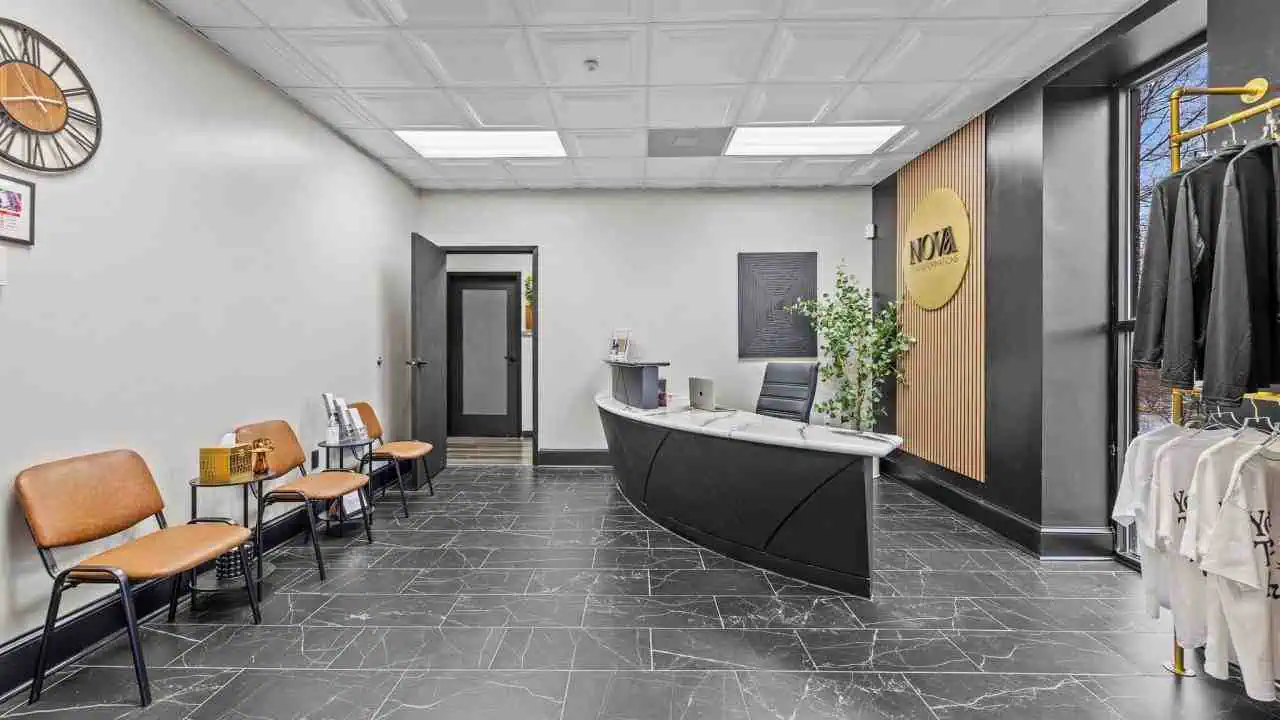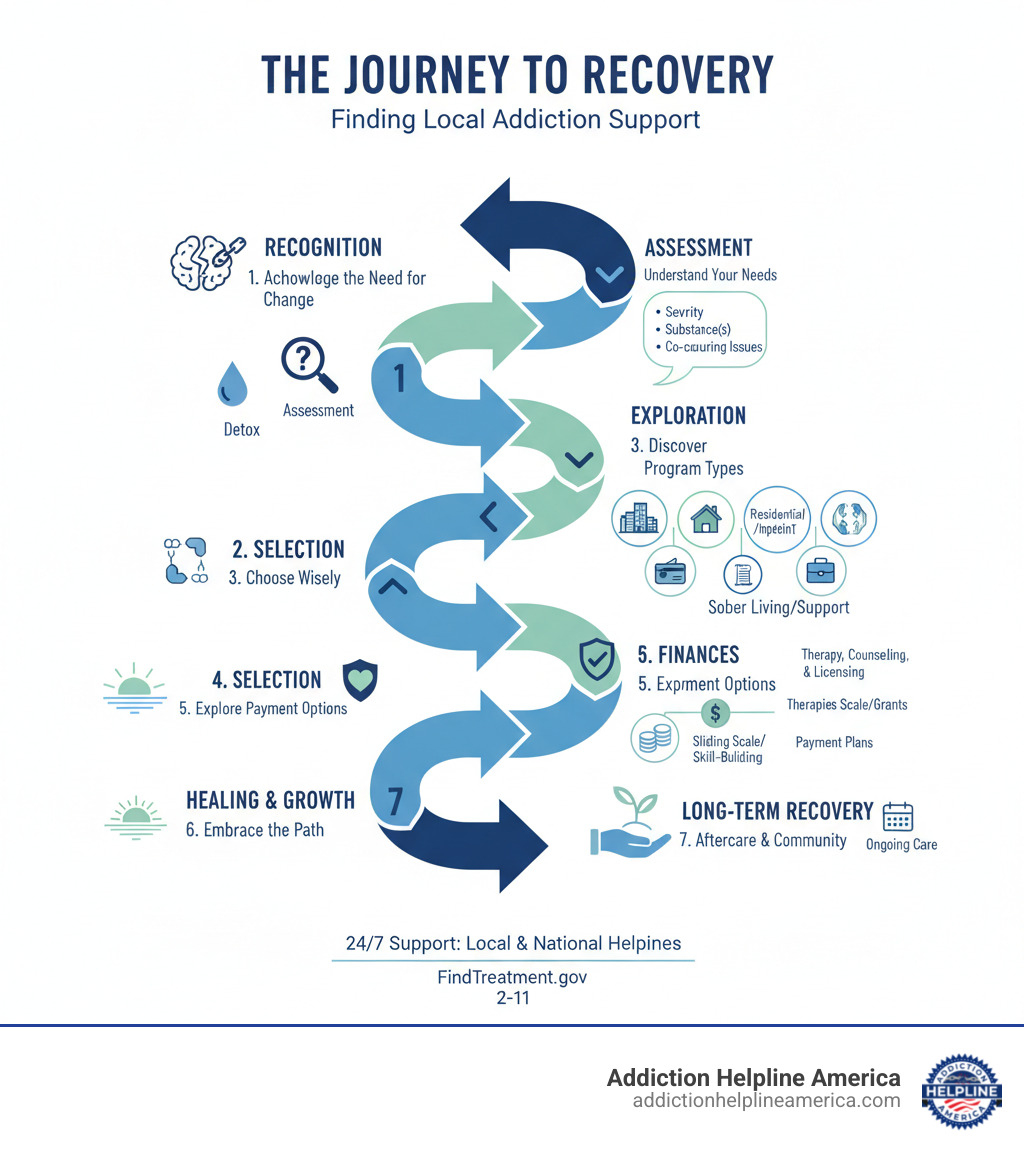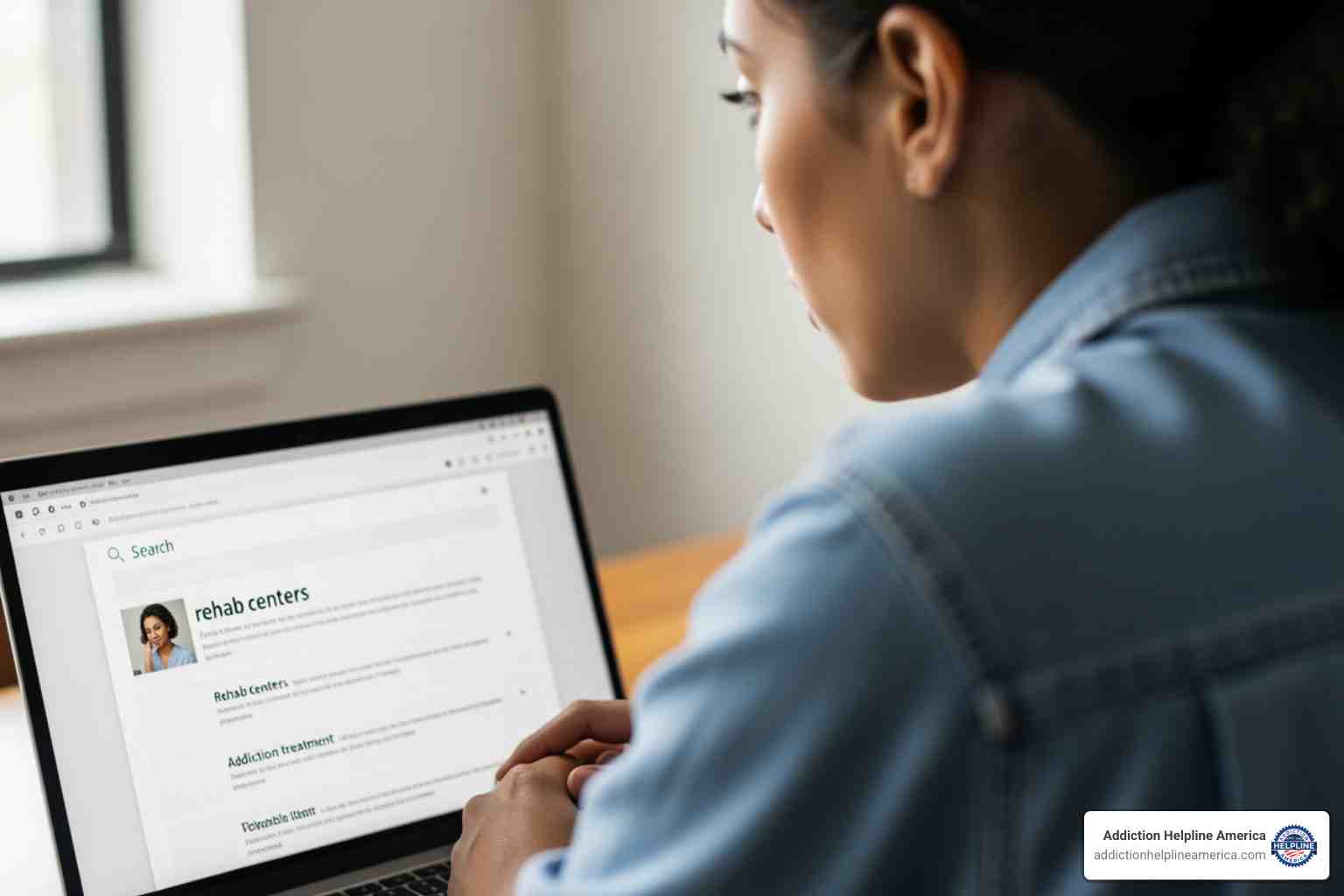
Finding Hope: Your Guide to Local Addiction Recovery Programs
Addiction recovery programs near me are facilities and services that help individuals overcome substance use disorders. If you’re reading this, you’ve already taken the most important step: asking for help. The path to recovery starts with finding the right support.
How to Find a Program:
- Call a Helpline: Reach out to a 24/7 addiction helpline for immediate guidance and referrals.
- Use Online Directories: Search trusted resources like FindTreatment.gov or your state’s substance abuse agency website.
- Contact Your Doctor: Ask your healthcare provider for referrals to licensed treatment centers.
- Verify Credentials: Look for facilities licensed by the state and accredited by organizations like CARF International.
- Assess Your Needs: Determine the right level of care, from medical detox and inpatient treatment to outpatient programs and sober living homes.
At Addiction Helpline America, we connect individuals with quality addiction recovery programs, providing 24/7 support and personalized guidance. Our mission is to make finding help as straightforward as possible, because every moment counts.

Addiction recovery programs near me word guide:
Recognizing the Need for Professional Help
It can be difficult to admit that substance use has become a serious problem. But addiction, or Substance Use Disorder (SUD), is not a moral failing; it’s a complex brain disease. Like any medical condition, it responds to professional treatment, which is why finding the right addiction recovery programs near me is so important.
What are the signs and symptoms of addiction?
Addiction appears differently in everyone, but common signs fall into three categories:
- Behavioral Changes: Neglecting responsibilities at work or school, abandoning hobbies, becoming secretive or defensive, and experiencing relationship problems.
- Physical Symptoms: Changes in sleep or appetite, unexplained weight changes, bloodshot eyes, and poor physical coordination. A key sign is increased tolerance (needing more of the substance for the same effect) and experiencing withdrawal symptoms (nausea, sweating, tremors, anxiety) when trying to stop.
- Psychological Signs: Intense cravings, a loss of control over use, and a desire to quit but being unable to do so. The most telling sign is continued use despite harm—knowing it’s causing health, financial, or relationship problems but being unable to stop.
How do I know if I or a loved one needs professional help?
Professional help is necessary when substance use crosses a line. Here are key indicators:
- Failed Attempts to Quit: If you or a loved one has tried to stop multiple times without success, professional support is essential. Addiction changes brain chemistry, making it incredibly difficult to quit alone.
- Impact on Daily Life: When substance use interferes with work, school, family, finances, or health, it’s time for an intervention.
- Denial: If a person insists there’s no problem despite clear evidence, they may be unable to see the reality of their situation. A pre-rehab addiction intervention can help.
- Crisis Situations: An overdose, arrest, or serious health complication is an emergency that demands immediate action.
A professional assessment is the most reliable way to determine the severity of the SUD and find the right level of care. Our confidential helpline at Addiction Helpline America is available 24/7 to connect you with qualified professionals for an assessment.
Understanding the Landscape of Addiction Treatment
Once you’ve recognized the need for help, the next step is understanding the types of addiction recovery programs near me. Addiction treatment is a spectrum of care, designed to meet you where you are in your journey.
Key levels of care include:
- Detoxification (Detox): A medically supervised process (typically 3-7 days) to safely manage withdrawal symptoms.
- Residential/Inpatient Treatment: 24/7 structured care in a live-in facility, removing you from daily triggers. Programs often last 28 to 90 days or more.
- Outpatient Programs: Therapy and counseling sessions at a treatment center while you live at home. This includes Partial Hospitalization (PHP), Intensive Outpatient (IOP), and standard weekly care.
- Sober Living Homes: Transitional, drug-free housing that bridges the gap between intensive treatment and independent living.
- Medication-Assisted Treatment (MAT): Combines FDA-approved medications with counseling to treat opioid and alcohol use disorders by reducing cravings and withdrawal symptoms.
At Addiction Helpline America, we can help you steer these options and find a program that matches your specific needs and goals.
Call Now – Your Journey to Recovery Begins Today!

Take the first step towards a healthier life! Call now to connect with our compassionate team and start your recovery journey today. Your path to healing awaits!
Our recovery specialists are available 24/7 to provide support, and all calls are confidential and free. Reach out anytime – we’re here to help!
What is the difference between inpatient and outpatient addiction treatment?
Choosing between inpatient and outpatient treatment is a key decision. Inpatient care is immersive and residential, while outpatient care allows you to live at home. The best choice depends on the severity of the addiction, your home environment, and other personal factors.
Here’s a practical comparison:
| Feature | Inpatient (Residential) Treatment | Outpatient Treatment |
|---|---|---|
| Environment | Live at the facility 24/7, completely removed from daily triggers and stressors | Live at home or in sober living, maintain connection to daily life |
| Intensity & Structure | Highly structured daily schedule with constant therapeutic activities and supervision | Less intensive with scheduled sessions; more personal freedom and responsibility |
| Medical Supervision | Full medical staff on-site around the clock for immediate care | Medical oversight typically through scheduled appointments with coordinating providers |
| Time Commitment | Requires full-time commitment; common lengths include 28, 42, or 90 days | Flexible scheduling allows you to continue work, school, or family responsibilities |
| Cost | Generally higher due to residential care, meals, and 24/7 staffing | Typically lower since it doesn’t include housing and round-the-clock care |
| Ideal Candidate | Severe addiction, unstable home environment, co-occurring disorders needing close monitoring, or previous outpatient treatment didn’t work | Less severe addiction, strong home support system, stable living situation, or transitioning from inpatient care |
If you’re unsure which path is right, our team at Addiction Helpline America can help you assess your needs and connect you with the appropriate level of care.
What is the typical duration of an addiction recovery program?
There is no universal timeline for recovery; treatment should match your individual needs. However, addiction recovery programs near me often follow common timeframes:
- Detox: 3 to 7 days for medical stabilization.
- Short-Term Residential: 28 to 42 days for intensive therapy and skill-building.
- Long-Term Residential: 60 to 90 days or more. Research shows longer stays often lead to better long-term outcomes by allowing more time to address underlying issues.
- Sober Living: Several months to a year or more, providing a supportive environment while you transition back to independent life.
- Outpatient Programs: Duration is flexible, ranging from several weeks to months, often stepping down in intensity over time.
Recovery is an ongoing process. Many people continue with support groups or therapy long after their initial program ends. The goal is to provide enough support to build a solid foundation for lasting recovery.
Call Now – Your Journey to Recovery Begins Today!

Take the first step towards a healthier life! Call now to connect with our compassionate team and start your recovery journey today. Your path to healing awaits!
Our recovery specialists are available 24/7 to provide support, and all calls are confidential and free. Reach out anytime – we’re here to help!
Specialized Programs and Approaches
Modern addiction treatment is not one-size-fits-all. Specialized programs are designed to address the unique circumstances that contribute to addiction.

- Gender-Specific Programs: Create safe environments for men or women to address unique challenges, such as trauma, societal pressures, and parenting roles.
- Holistic Treatment: Integrates traditional therapies with practices like yoga, meditation, art therapy, and nutritional counseling to heal the mind, body, and spirit.
- Trauma-Informed Care: Essential for those whose addiction is rooted in trauma. These programs prioritize safety and help individuals process past experiences without re-traumatization.
- Dual-Diagnosis Treatment: Simultaneously treats both substance use disorders and co-occurring mental health conditions like depression, anxiety, or PTSD.
- Programs for Specific Substances: Tailor treatment to the unique challenges of certain drugs, such as alcohol abuse treatment or fentanyl addiction treatment.
Finding a program that fits your specific needs is crucial for lasting change. At Addiction Helpline America, we can connect you with facilities that offer the specialized care you deserve.
How to Find Reputable Addiction Recovery Programs Near Me
Finding the right addiction recovery program near me is manageable when you know where to look and what to ask. A systematic approach using trusted resources is the best way to choose a quality facility.

How can I find qualified addiction recovery programs near me?
Here’s a straightforward process for finding a qualified program:
- Use Trusted Online Resources:
- SAMHSA’s National Directory: The Substance Abuse and Mental Health Services Administration (SAMHSA) offers a searchable directory at FindTreatment.gov. It’s a comprehensive, reliable source for licensed facilities across all 50 states.
- State-Level Resources: Check your state’s Department of Health or Substance Use Disorder agency website for local directories and resources.
- Speak with a Healthcare Provider: Your doctor or therapist can provide referrals to reputable local programs and help assess the level of care you need.
- Verify Credentials: Before committing, always confirm a program’s licensing and accreditation to ensure it meets quality and safety standards.
- Use Addiction Helpline America: We specialize in connecting individuals to licensed and accredited treatment centers nationwide. Our free, confidential service helps you steer your options and find the right program from our trusted network.
What accreditations or certifications should I look for in a recovery center?
Accreditations are vital indicators of a center’s commitment to quality care. Here’s what to look for:
- State Licensure: This is the most basic requirement. Any legitimate program must be licensed by the state in which it operates.
- Recognized Accreditations: Look for accreditation from national organizations, which signifies a higher standard of care. The most respected include:
- CARF International (Commission on Accreditation of Rehabilitation Facilities): This is a gold standard, indicating a commitment to person-centered care and continuous improvement.
- The Joint Commission: This accreditation shows a facility meets strict quality and safety standards, similar to those in hospitals.
Accreditation ensures patient safety, the use of evidence-based practices, and qualified staff. We always recommend verifying these credentials to ensure you’re choosing a safe environment for recovery.
The Comprehensive Treatment Journey: From Admission to Aftercare
The recovery journey is a multi-stage process that extends far beyond the initial treatment program. Understanding this path, from therapy and medication to long-term aftercare, is key to sustainable sobriety.
What is the role of therapy and counseling in addiction recovery?
Therapy and counseling are the cornerstones of addiction recovery, providing the tools to understand and overcome a substance use disorder.
- Individual Therapy: One-on-one sessions with a therapist help you explore the root causes of addiction, process trauma, and develop personal coping skills. Common approaches include Cognitive Behavioral Therapy (CBT) and Motivational Interviewing (MI).
- Group Counseling: Sharing experiences in a group setting fosters a sense of community, reduces isolation, and helps develop social and communication skills.
- Family Therapy: Involving loved ones helps heal strained relationships, improve communication, and build a strong support system for long-term recovery.
What is Medication-Assisted Treatment (MAT)?
Medication-Assisted Treatment (MAT) is an evidence-based approach combining FDA-approved medications with counseling to treat substance use disorders, particularly for opioid and alcohol addiction.
- How it Works: MAT helps normalize brain chemistry, relieve cravings, and manage withdrawal symptoms. This allows individuals to focus on the therapeutic work of recovery.
- FDA-Approved Medications: For opioid use disorder, medications include Buprenorphine and Naltrexone. For alcohol use disorder, medications include Naltrexone and Acamprosate.
- Proven Effectiveness: MAT is proven to improve patient survival, increase treatment retention, and reduce illicit substance use. It is a comprehensive strategy, not just a substitute for one drug with another.
Many addiction recovery programs near me integrate MAT into their treatment plans.
What happens after completing a program (aftercare)?
Completing a program is a major milestone, but recovery is a lifelong journey. Aftercare, or continuing care, provides ongoing support to prevent relapse and solidify sobriety.
- Importance of Continuing Care: Individuals who engage in aftercare have significantly higher rates of long-term sobriety. It bridges the gap between structured treatment and the challenges of daily life.
- Sober Living Homes: These residences offer a safe, drug-free environment for individuals transitioning out of inpatient care. They provide peer support and structure while residents rebuild their lives.
- Alumni Programs: Many treatment centers offer alumni networks for ongoing support, connection, and encouragement from peers.
- Peer Support Groups: Organizations like Narcotics Anonymous (NA) and Alcoholics Anonymous (AA) offer invaluable, widely available support through shared experiences and sponsorship.
- Ongoing Therapy: Continuing with individual or group therapy helps manage new challenges and reinforces coping strategies.
- Relapse Prevention Planning: A core part of aftercare is creating a plan to identify triggers, build a support network, and know what to do if cravings arise.
Navigating the Financial Aspect of Recovery
One of the biggest concerns when searching for addiction recovery programs near me is the cost. While it can seem daunting, recovery is a worthwhile investment, and there are many options to make it affordable.
What is the cost of addiction treatment, and are there financial assistance options?
Treatment costs vary widely depending on the level of care needed.
- Medical Detox: Costs can range from a few thousand to over ten thousand dollars, depending on the level of medical supervision required.
- Inpatient/Residential Treatment: As the most comprehensive option, a 28-day program can cost from $10,000 to $30,000 or more. Longer programs cost more but often lead to better outcomes.
- Outpatient Programs: A more budget-friendly option, with costs ranging from a few hundred to several thousand dollars per month, as they don’t include room and board.
- Sober Living Homes: These charge monthly rent, typically between $500 and $2,000, providing a supportive, substance-free living environment.
Before letting these numbers discourage you, consider the payment options available:
- Health Insurance: Most private insurance, Medicare, and Medicaid plans cover addiction treatment as an essential health benefit. Your specific coverage will depend on your plan’s deductibles and co-pays.
- Sliding Scale Fees: Many facilities offer fees based on your income and ability to pay.
- Payment Plans: Most reputable centers are willing to arrange manageable monthly payment plans.
- State-Funded Programs: Every state receives funding to provide low-cost or free treatment services for those with limited income. Check your state’s substance abuse agency website or the SAMHSA National Directory for these options.
Consider the cost of not getting treatment—lost jobs, legal fees, and declining health often far exceed the cost of recovery. Investing in treatment is an investment in your life.
Don’t let financial concerns stop you from reaching out. Call us at Addiction Helpline America. We can help verify your insurance, explore financial assistance, and find a program that works for your budget. You don’t have to figure this out alone.
Call Now – Your Journey to Recovery Begins Today!

Take the first step towards a healthier life! Call now to connect with our compassionate team and start your recovery journey today. Your path to healing awaits!
Our recovery specialists are available 24/7 to provide support, and all calls are confidential and free. Reach out anytime – we’re here to help!
Conclusion
Searching for addiction recovery programs near me is a courageous first step toward a new beginning. Recovery is not just about stopping substance use; it’s about reclaiming your life, rebuilding relationships, and refinding your hope for the future.
We’ve covered how to recognize the need for help, understand treatment options, find reputable facilities, and steer the financial aspects of care. While the journey to recovery has its challenges, you are not alone in this fight. Every step forward is a victory.
Addiction Helpline America is here to make this process as simple and supportive as possible. Our team provides free, confidential, and personalized guidance, connecting you with the right recovery program from our trusted network of providers across all 50 states. We’ll walk alongside you, answering your questions and ensuring you feel confident about the next step.
Whether you’re in Alabama or Alaska, California or Connecticut, help is available right now. The program you’ve been searching for is ready to help you find your way back to health.
Don’t let another day pass. Reach out and let us help you find the path forward.
Find personalized rehabilitation services
Your new beginning starts today.
Our helpline is 100%
free & confidential
If you or someone you care about is struggling with drug or alcohol addiction, we can help you explore your recovery options. Don’t face this challenge alone—seek support from us.
Programs
Resources
Will my insurance
cover addiction
treatment?
We're ready to help
Find the best
drug or alcohol treatment
center
Are you or a loved one struggling with addiction? Call today to speak to a treatment expert.















